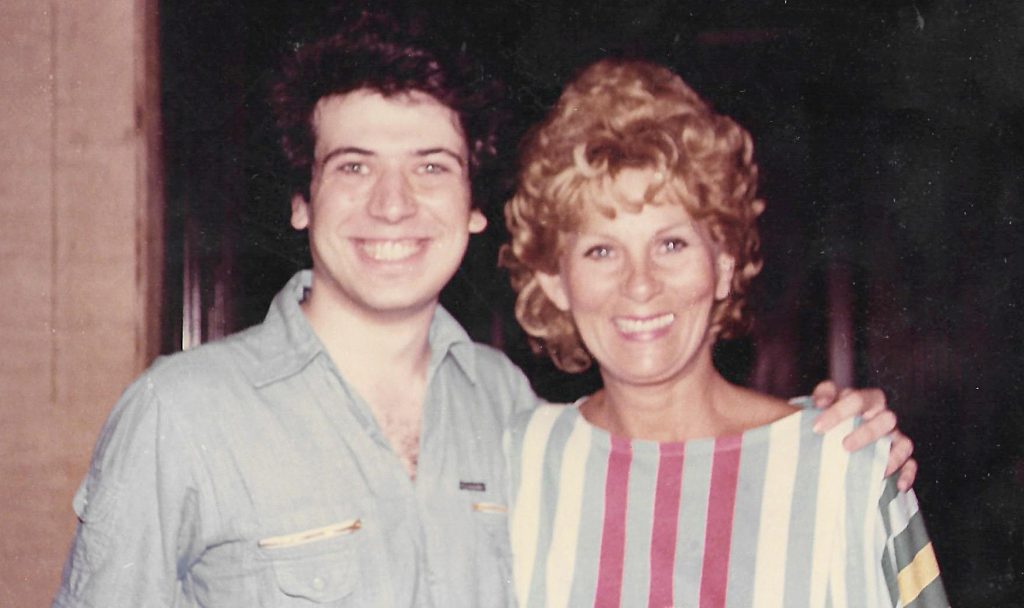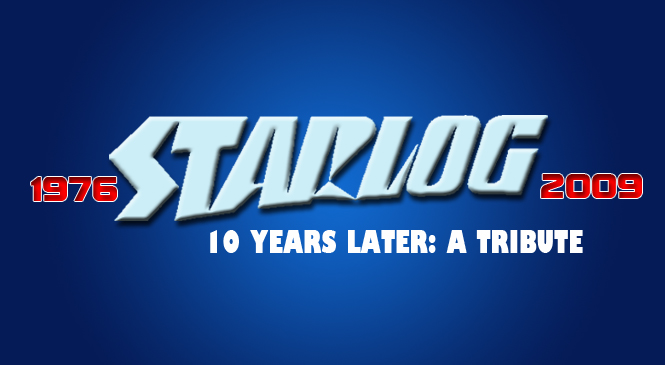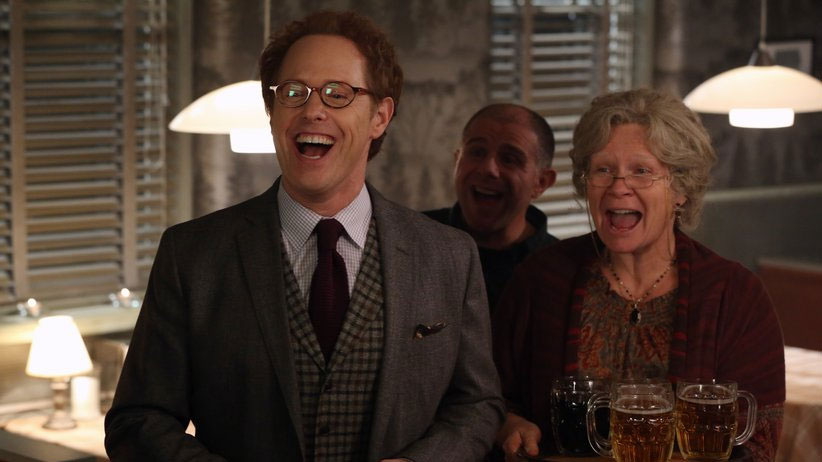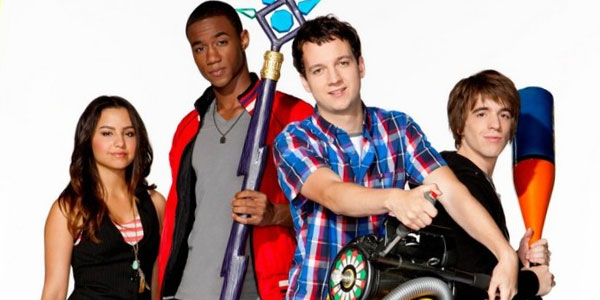Dan Dickholtz: “I Really Couldn’t Stay Away” From STARLOG

These days, most people know him as “Daniel Dickholtz”, but back in the day he was simply “Dan”, and Dan was one of those writers who stumbled into Starlog and never quite left.
“In college, I had done a little work on our school newspaper, The Daily Targum. I was at Rutgers. And I mostly did some book and movie reviews, and me being the geek that I am, it was mostly genre stuff, including one that was like a roundup of several Star Trek novels. And when I graduated, I actually didn’t have a clear plan. And after a month, my parents said, ‘Maybe you should get a job.'”
That led to Dickholtz putting together a resume and a collection of articles, which he then sent to the offices of Starlog, pretty much on a whim because he’d always loved reading the magazine. “I figured I’ll hear from them or I won’t hear from them, and then I’ll have to think of what else I might like to do.”
As it turned out, Starlog had a position to fill, so they called Dickholtz in for an interview with Milburn Smith and Dave McDonnell. “And one of the first questions Milburn asked me was, ‘OK, so how did you hear about the opening?’ And I said, ‘There’s an opening?’ And they just looked at me, ‘So how did you hear about this?’ I said, ‘I just love the magazine, and so I thought I’d give it a shot.'” It was June of 1985, and he was off and running.
Originally hired to be a “jack of all trades” for the Starlog Group of publications, Dickholtz found himself working on all sorts of titles — including the very short-lived attempt to compete with Playgirl with a magazine called Allure (not to be confused with the current magazine of the same name). “I was doing stuff on the teen magazines, I was reading stuff for Fangoria, I was proofreading stuff for Starlog, and one of my very first writing assignments for Starlog was to interview Grace Lee Whitney.”

And although he’d written for his school paper at Rutgers, this was a little bit bigger. Whitney was in town for a convention, and McDonnell gave Dickholtz the assignment. “Someone from Star Trek?” he remembers saying. “That’s great! How?…”
Dickholtz was not the only fresh out of college writer to be brought on staff at Starlog. McDonnell made it a point to nurture young talent with an interest in genre. And in the offices, there was a lot of mentoring and critiquing. “I remember one time – and it was a lesson that stood me well in the end – I used to go in for really long ledes, and one went on a little too long. He sat me down and he read this, in hindsight, ridiculously long sentence until he ran out of oxygen. And he said, ‘There’s supposed to be a period in the middle of all that. Find it.'”
The style of his writing focused on the words of the interview subject, with the “writing” just serving as a bridge between quotes. Dickholtz said his job was (and is still) to get the interviewee’s words across, because the reader was coming for the likes of Grace Lee Whitney or Peter Weller. “They’re not there for me. My ego’s not that big.”
Speaking of egos… when asked about the interviews that we all get, that difficult person who makes the job just a little more difficult than it should be. “…there was one actor. The interview was going great, I thought, and I made the mistake – which I didn’t think it was a mistake – I had watched the pilot of the show I was interviewing him about, and it was him and four other people. They all had something to do, and I referred to it more than once as an ensemble. And he didn’t appreciate it. He just blew up. And I just played along with it. I said, ‘Well, yeah, that’s how some people might view it. Of course you’re the star of it.’ And once I said that, he was completely placated and we got back into the groove of it.
The need to be professional in the difficult situations was just as important in other situations, too. Early on, Dickholtz would have to remind himself to “be professional” and not gush so much as a fan, and after a while it was much easier to keep the two separate. The interviews themselves were always strictly business, and the fan moments, he says, would come during the days before and after. There’s the understandable excitement and anticipation running up to the interview, and of course, afterwards, there are bragging rights and name dropping with the friends…
The biggest fanboy moment came when Dickholtz got to interview Alan Moore, for the second time. The first time, he got about ten minutes to talk to Moore about the potential Watchmen movie adaptation, but the second time was a little more chancy. “We had another opportunity to talk to him, but Dave was saying, ‘You’re never gonna get him. He’s too big.’ I gave him a call, and we set up what turned out to be a three-hour interview. And part of me was going, ‘I’m talking to my idol!’ But I kept it down until the very, very end of the interview, when I got to say – then I got to gush – and I don’t know if he was a little embarrassed, but at least I saved it to the end.”
Life in the bullpen was never dull. Everyone was working together on several books, helping each other with the different deadlines and pieces to proofread. “We were reading Fangoria stuff, they were proofreading our stuff. Every article got proofread by about nine different people. And somebody would have something to say that everybody else hadn’t thought of. So there was a lot of engagement.” That engagement was enhanced by the fact that everyone in the office had similar interests in genre, to a certain degree.
Dickholtz’s interests in horror, for example, was given a boost by his time at the Starlog Group. “I hadn’t been a Fangoria reader until I joined the company. I was firmly on the Starlog side, and really Fangoria had opened up a much greater appreciation of the horror genre for me. And they always had interesting people dropping by.” Dickholtz says the years he was on staff were “some of the best of my life, and I just really couldn’t stay away completely.” So he went back as a freelancer, writing several articles for the various titles.
Tony Timpone, editor of Fangoria at the time, even gave Dickholtz his first set visit assignment. This came after the writer had gone freelance. “Out of the blue, Tony…called me up and said – after ‘hi, how are you?’ – the very next thing he said was, ‘Didn’t you used to live in Marlboro?’ “And I’m thinking, we haven’t spoken to each other in years, and this is what he brings up? And they were shooting a horror movie at the Marlboro State Psychiatric Hospital, which had been abandoned for years. And he asked, ‘Did you ever hear of this place?’ “And I said, ‘Everybody heard of that place. Back in the day, the lunatics were always escaping! Everybody knew.’ “‘Well, they’re doing this horror movie. Would you like to go?’ “‘Yes!'” At last. I knew if I was just patient long enough I’d get to do one.”
The freelance work continued until the magazine group started to have financial difficulties in the early 2000’s. “I had freelanced for it through that new ownership that they had until checks just never seemed to come through. And ‘OK, this guy seems to think that freelancers actually work for free.’ And I had severed my ties, and then it wasn’t too long before the magazine just up and went.”
That “new ownership” is now the previous ownership, as Dallas-based Cinestate has since bought the assets and the titles and has started publishing Fangoria again as a new quarterly print publication. And Dickholtz is glad to see the book return, even though he also thinks a print-only format might need to evolve into a mix of print and online content. “With all kinds of established web sites, much less the citizen journalists, I’m not sure how sustainable a model that is, to insist on being print only. I think there certainly is a place, and will always be a place, for print. Certainly, when I do pick up magazines, if it’s something that’s got a lot of great art, a lot of great photos, I don’t want to see that on my Kindle.”
And with Timpone once again involved with Fangoria, would Dickholtz consider freelancing again? “I could be tempted,” he says with a grin. “If they then turned around and said, ‘And we’re bringing back Starlog and Comics Scene’ I’d probably be knocking on their door. But yeah, I’m glad to see it’s under owners who actually know the product, who actually care about it, who aren’t just using it as a name.”
As for what he’s working on now, Dickholtz is getting back to a few projects that have languished in the midst of life happening — family, working at a software company and other jobs and circumstances along the way — one of them being a non-fiction collection of interviews. He also has a fiction project that grew out of his nostalgia for his time at Starlog, and he mentions it along with his appreciation for fan films. “These people are not gonna make a penny off of it, but they had an idea, and they wanted to make it happen, and they just did it. And now that my kids are older, and I’m certainly not getting any younger, I’m thinking I’ve put off things that I wanted to do. Now I ought to start doing it. Other people can do it. I can do it.”
He’s not ready to say just what it is yet, but he does say that “Starlog is going to be in the DNA of these projects. It meant a lot to me at the time. It meant a lot when I was just freelancing. And this is sort of my love letter back.”
![]()




